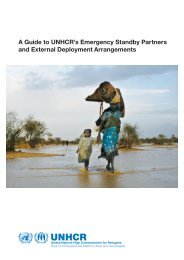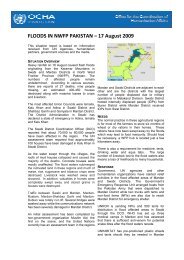Women, Girls, Boys and men - HumanitarianInfo.org
Women, Girls, Boys and men - HumanitarianInfo.org
Women, Girls, Boys and men - HumanitarianInfo.org
You also want an ePaper? Increase the reach of your titles
YUMPU automatically turns print PDFs into web optimized ePapers that Google loves.
I A s c g e n D e r h A n D b o o k<br />
genDer ImplIcAtIons oF Imple<strong>men</strong>tIng the prIncIples oF cAmp coorDInAtIon AnD cAmp mAnAge<strong>men</strong>t<br />
• Access <strong>and</strong> proximity: draw up an agree<strong>men</strong>t with national authorities to have access to the camp <strong>and</strong> ensure a sustained field presence<br />
<strong>and</strong> proximity to the affected persons. develop <strong>and</strong> maintain effective relationships with the displaced, local communities <strong>and</strong><br />
local authorities. this requires balanced teams of wo<strong>men</strong> <strong>and</strong> <strong>men</strong> among camp coordinating <strong>and</strong> managing agencies <strong>and</strong> partner<br />
staff for outreach among wo<strong>men</strong> <strong>and</strong> <strong>men</strong> in the affected <strong>and</strong> host communities. free access <strong>and</strong> proximity ensure monitoring of<br />
protection risks <strong>and</strong> imple<strong>men</strong>tation of protection solutions.<br />
• Community participation: take specific actions such as ensuring equal representation of wo<strong>men</strong> <strong>and</strong> <strong>men</strong> in community-based decision-making<br />
structures <strong>and</strong> provide capacity-building sessions in knowledge <strong>and</strong> skills to undertake community leadership roles.<br />
Work in partnership with displaced wo<strong>men</strong>, girls, boys <strong>and</strong> <strong>men</strong> to identify <strong>and</strong> strengthen their capacities <strong>and</strong> mobilize their participation<br />
in all aspects of camp life. provide opportunities <strong>and</strong> institute systems for increased community participation in day-to-day<br />
manage<strong>men</strong>t of the camp <strong>and</strong> participate in decision-making related to the camp.<br />
• Rights- <strong>and</strong> community-based approach: promote respect for <strong>and</strong> protection of rights of all affected wo<strong>men</strong>, girls, boys <strong>and</strong> <strong>men</strong>,<br />
with a particular consideration for the protection of the rights of wo<strong>men</strong> <strong>and</strong> girls, in all areas of work.<br />
• Sustainable solutions through a community-based approach: identify positive coping mechanisms, skills <strong>and</strong> resources of<br />
displaced wo<strong>men</strong>, girls, boys <strong>and</strong> <strong>men</strong>, <strong>and</strong> promote a community-based approach to imple<strong>men</strong>t sustainable solutions to their<br />
issues <strong>and</strong> problems.<br />
• Capacity-building of local partners: support local partners to apply a community-based approach in camp coordination <strong>and</strong> manage<strong>men</strong>t<br />
<strong>and</strong> build their skills <strong>and</strong> underst<strong>and</strong>ing of gender <strong>and</strong> human rights di<strong>men</strong>sions.<br />
• Humanitarian principle, ethical behaviour <strong>and</strong> code of conduct: respect humanitarian principles <strong>and</strong> adhere to the iasC code of<br />
conduct. Camp manage<strong>men</strong>t agencies should meet humanitarian principles <strong>and</strong> basic ethical st<strong>and</strong>ards, <strong>and</strong> ensure imple<strong>men</strong>tation<br />
of the secretary-General’s Bulletin on preventing <strong>and</strong> responding to sexual exploitation <strong>and</strong> abuse.<br />
ACTIonS To EnSurE GEndEr<br />
EquAlITy ProGrAmmInG In<br />
CAmP CoordInATIon And CAmP<br />
mAnAGEmEnT<br />
camp pol cy<br />
• Undertake consultations <strong>and</strong> dialogue with national<br />
govern<strong>men</strong>t <strong>and</strong> local authorities or, in their absence,<br />
the non-state actor that is in effective control, to develop<br />
a national camp policy.<br />
• Undertake participatory assess<strong>men</strong>t <strong>and</strong> gender <strong>and</strong><br />
age analysis of the protection risks <strong>and</strong> needs of the<br />
displaced population <strong>and</strong> work with the national authorities<br />
to ensure that these are reflected in the develop<strong>men</strong>t<br />
of the camp policy <strong>and</strong> strategy.<br />
• Ensure that the camp policy recom<strong>men</strong>ds strategies for<br />
the participation of affected wo<strong>men</strong> <strong>and</strong> <strong>men</strong> of different<br />
age groups <strong>and</strong> backgrounds in the needs assess<strong>men</strong>t,<br />
the delivery of protection <strong>and</strong> assistance <strong>and</strong> develop<strong>men</strong>t<br />
<strong>and</strong> imple<strong>men</strong>tation of durable solutions.<br />
• Develop clear communication channels to share the<br />
camp policy with non-humanitarian actors, such as<br />
media, civil society, donors <strong>and</strong> diplomatic community<br />
<strong>and</strong> the local/host communities, to advocate on issues<br />
faced by displaced wo<strong>men</strong>, girls, boys <strong>and</strong> <strong>men</strong>.<br />
• Develop <strong>and</strong> sustain systems of information sharing<br />
<strong>and</strong> joint planning <strong>and</strong> review with other humanitarian<br />
<strong>and</strong> develop<strong>men</strong>t partners, within the Camp Coordination<br />
<strong>and</strong> Camp Manage<strong>men</strong>t cluster, such as camp<br />
managing agencies, as well as other cluster/sectoral<br />
partners, the IASC country team <strong>and</strong> others.<br />
S te dent ficat on <strong>and</strong> negot at on<br />
• Talk with national authorities <strong>and</strong> other actors to make<br />
agree<strong>men</strong>ts to assign appropriate l<strong>and</strong> <strong>and</strong> occupancy<br />
rights for temporary camp settle<strong>men</strong>ts <strong>and</strong> resolve all<br />
disputes arising from the appropriation of l<strong>and</strong>.<br />
• Ensure that the needs of wo<strong>men</strong> <strong>and</strong> <strong>men</strong> are represented<br />
with respect to the location of camps <strong>and</strong> in all<br />
agree<strong>men</strong>ts for access to sustenance farming l<strong>and</strong> <strong>and</strong><br />
use of local resources, including local markets, water<br />
<strong>and</strong> forest products.<br />
ident ficat on <strong>and</strong> manage<strong>men</strong>t of camp manage<strong>men</strong>t<br />
agenc es <strong>and</strong> partners<br />
• Ensure that all potential camp manage<strong>men</strong>t agencies<br />
<strong>and</strong> partners have a commit<strong>men</strong>t to gender mainstreaming,<br />
have trained their staff accordingly <strong>and</strong> underst<strong>and</strong><br />
their responsibilities with respect to this.<br />
• Ensure that all camp manage<strong>men</strong>t agencies have a<br />
rights- <strong>and</strong> community-based approach to support<br />
gender mainstreaming <strong>and</strong> respect for human rights.<br />
G e n d e R A n d C A m P C o o R d I n AT I o n A n d C A m P m A n A G e m e n T I n e m e R G e n C I e S<br />
cccM











